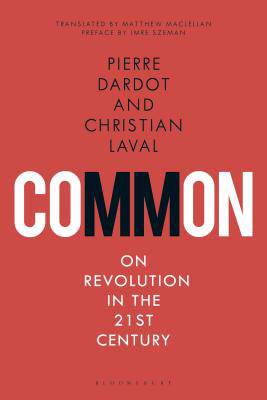
- Afhalen na 1 uur in een winkel met voorraad
- Gratis thuislevering in België vanaf € 30
- Ruim aanbod met 7 miljoen producten
- Afhalen na 1 uur in een winkel met voorraad
- Gratis thuislevering in België vanaf € 30
- Ruim aanbod met 7 miljoen producten
Zoeken
€ 322,45
+ 644 punten
Uitvoering
Omschrijving
Around the globe, contemporary protest movements are contesting the oligarchic appropriation of natural resources, public services, and shared networks of knowledge and communication. These struggles raise the same fundamental demand and rest on the same irreducible principle: the common.
In this exhaustive account, Pierre Dardot and Christian Laval show how the common has become the defining principle of alternative political movements in the 21st century. In societies deeply shaped by neoliberal rationality, the common is increasingly invoked as the operative concept of practical struggles creating new forms of democratic governance. In a feat of analytic clarity, Dardot and Laval dissect and synthesize a vast repository on the concept of the commons, from the fields of philosophy, political theory, economics, legal theory, history, theology, and sociology. Instead of conceptualizing the common as an essence of man or as inherent in nature, the thread developed by Dardot and Laval traces the active lives of human beings: only a practical activity of commoning can decide what will be shared in common and what rules will govern the common's citizen-subjects. This re-articulation of the common calls for nothing less than the institutional transformation of society by society: it calls for a revolution.Specificaties
Betrokkenen
- Auteur(s):
- Vertaler(s):
- Uitgeverij:
Inhoud
- Aantal bladzijden:
- 496
- Taal:
- Engels
Eigenschappen
- Productcode (EAN):
- 9781474238601
- Verschijningsdatum:
- 24/01/2019
- Uitvoering:
- Hardcover
- Formaat:
- Genaaid
- Afmetingen:
- 156 mm x 234 mm
- Gewicht:
- 866 g

Alleen bij Standaard Boekhandel
+ 644 punten op je klantenkaart van Standaard Boekhandel
Beoordelingen
We publiceren alleen reviews die voldoen aan de voorwaarden voor reviews. Bekijk onze voorwaarden voor reviews.








